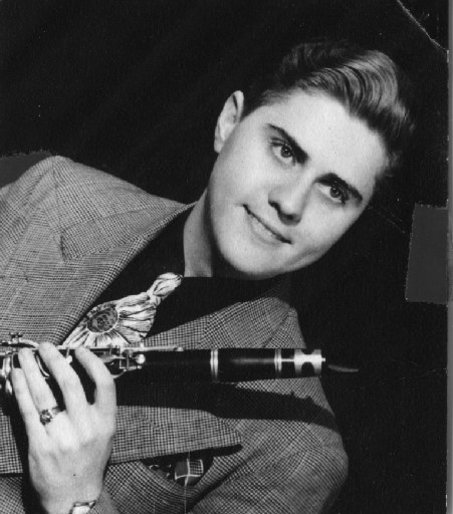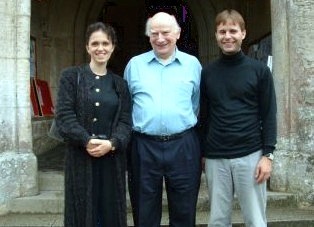The emblematic principal clarinet of the New York Philharmonic is 90 today.
He gives an expansive interview to clarineat.com here.
The Guinness Book of Records has him down as the longest-serving clarinet in a professional orchestra. In 60 years in the orchestra, he says, he never cracked a clarinet. ‘I played so much it never got dry,’ he explains.

… inWashington, D.C.
Announced today by Gianandrea Noseda and the National Symphony Orchestra, the nine symphonies will be performed over three weeks in May-June 2020.
Gianandrea said: ‘Beethoven changed the world. There are many great artists, of course, but few actually changed the world—Da Vinci, Dante, and of course, Beethoven. It’s an honor for me and the talented musicians of the NSO to present these monumental nine symphonies over three weeks next season. After what will be three years together, the time seems right to take on these works—the Mt. Everest of the symphonic repertoire—together and share them with our audiences in a focused, festival-type setting.’

New York City’s classical music station has hired Jacqui Cheng as its first ever Editor-in-Chief, Music.
Jacqui plays violin in the New Amsterdam Symphony Orchestra, but that’s not why they hired her.
She is a digital data-driver, former Editor-in-Chief of the product review website Wirecutter and, before that, of Ars Technica.

A few dozen BDS supporters, rallied by the Adalah network, staged a mostly good-natured protest outside Carnegie Hall yesterday while the Israel Philharmonic gave a concert inside.
There were no attempts to disrupt the concert itself.
Yoel Levi conducted, in place of the unwell Zubin Mehta, whose farewell tour this should have been.

Photo: Israel consulate, NY
The Times reports today that scalpers on Viagogo are charging vast amounts to see and hear Netrebko and Kaufmann in Forza del Destino, the first time they have appeared together in a decade, apparently.
The paper feigns outrage over the tickets being subsidised by the taxpayer, which is true.
But there’s a market at work out there. If someone was lucky enough to score seats for the rare event and can’t use them, what should they do – give them away?
And if someone else is prepared to pay a king’s ransom to see Anna and Jonas entwined before they die, what’s to stop them?

As they once were.
The Swedish soprano suffered an injury more common to footballers during rehearsals for Strauss’s Elektra in Chicago. Was she bothered?
From Larry Johnson at Chicago Classical Review:
…A curtain announcement Saturday night informed Lyric’s audience that Nina Stemme, singing the title role, had injured her knee in rehearsals and asked for their indulgence. The Swedish soprano did indeed seem to be limping and favoring one foot in the early going. But as the performance continued, the injury seemed to affect her less and less…
Read on here.

The Vladikavkaz outpost of Valery Gergiev’s Mariinsky empire has been treated to a piano recital by Abisal Gergiev, son of the supreme leader.
A student at the St Petersburg conservatoire, Abisal played Bach, Schubert, Chopin, and Rachmaninov.
Gergiev’s sister, Larissa Gergeieva, is head of the Mariinsky’s youth academy.
Vladikavkaz, in northern Ossetia, is the family’s home province.
Abisal Gergiev, 18, is already listed on the Mariinsky site.

We have sad news of the death of Graham Melville-Mason, a British authority on Czech music and one of its great ambassadors in the English-speaking world. He was 85.
Graham taught himself Czech in the 1970s by talking to a neighbour from the BBC Czech Service while they walked their dogs. He was head of the Dvorak Society,taught at Edinburgh University and Prague, and served for 20 years as music advisor to the Edinburgh Festival.

Bolot Osmonov, head of the Kyrgyzstan Opera Ballet Theatre, must have thought he was being really cool when he rented the house for a day to a convention of gamers.
But Boris was unware how violent some of these games are. The gamers wrecked the house and Boris got the sack.
Read all about it here.

Andrea ‘Fluterscooter’ Fisher was getting excited about this summer’s new category at the Tchaikovsky Competition – until she saw the age limit:
In light of the famed Tchaikovsky Competition opening to woodwinds for the first time since its beginning in 1958, the flute community was abuzz with excitement. A friend suggested I enter, and the first woodwind prize of $30,000 caught my eye, not for myself (as I’m well “expired”) but for other deserving flutists. Of course, I knew there was a catch as I read through the competition rules: “The age limit of participants as of the date of the Competition opening for instrumentalists is not younger than 16 and not older than 32 years of age inclusive.” Facebook’s latest vanity meme wants to know “How Well You Have Aged in 10 Years,” and in an age where we refuse to be defined by age, we sure like to be reminded that we haven’t aged one bit. However, the jury members of flute competitions do not care if we look 25; you can’t put filters on your birth certificate, and in the case of the Tchaikovsky competition, if you’re over 32, you’re TOO OLD. Compared to the other big International Competitions, the Tchaikovsky has a generous maximum age requirement. For the Nielsen and Prague Spring Competitions: cutoff is 30. The NFA Young Artist competition is also 30. The Kobe Competition, 32.
So, what is the message that is telling us? How is that affecting our mental health as musicians, for those who are older and for those who are in their 20’s or younger? I remember my 19th birthday. It was the first birthday I did not wish to celebrate, as I felt I was starting my race against the fast ticking clock of the classical music industry. It wasn’t until after I turned 30 that I started embracing my age, since I was already expired and nothing I could do about it (except printing a fake birth certificate, which I considered..)…

Read on here.
Ageism in classical music? We need to talk.










